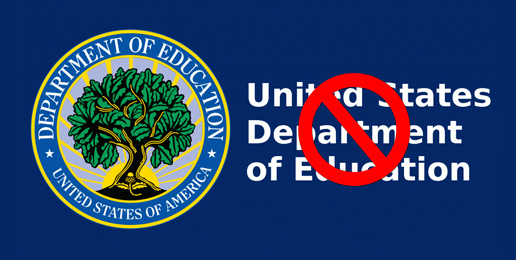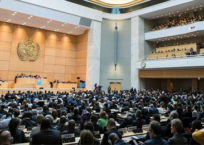
A coalition of Republican lawmakers led by U.S. Congressman Thomas Massie (R-KY) introduced legislation to shut down the U.S. Department of Education, arguing that there is no constitutional authority for the controversial bureaucracy to exist. Top Republicans from Reagan to Trump have called for such a move but it has remained elusive thus far.
The bill, dubbed “H.R. 899 – To terminate the Department of Education,” is just one sentence long: “The Department of Education shall terminate on December 31, 2023.” If approved, the federal agency would have to cease operations prior to next year, with control reverting to states and local communities.
The liberty-minded Kentucky lawmaker, who announced the move on Twitter on February 14, has been a longtime champion of ending federal involvement in education. “Unelected bureaucrats in Washington, D.C. should not be in charge of our children’s intellectual and moral development,” the congressman said when he filed the same bill in the previous Congress.
“States and local communities are best positioned to shape curricula that meet the needs of their students,” he said. “Schools should be accountable. Parents have the right to choose the most appropriate educational opportunity for their children, including home school, public school, or private school.”
Massie expanded on his views in an interview with this writer shortly after Trump’s election. Noting that the outfit was established by unpopular President Jimmy Carter as a “re-election tactic, as a ploy,” Massie said his own legislation was originally a response to constituents concerned about federal indoctrination of their children under then-Education Secretary Betsy DeVos.
Seizing on the opportunity, Massie filed the bill, putting liberals in the very awkward position of having to defend the Trump administration’s involvement in the education of children if they wanted to keep the department. “The left understands that this is where you win or lose — in the schools and in the teaching of the children,” Massie said.
Other lawmakers who joined Massie by co-sponsoring the bill include the influential former U.S. House Freedom Caucus Chairman U.S. Representative Andy Biggs. Also co-sponsors are U.S. Representatives Mary Miller of Illinois, Russ Fulcher of Idaho, Georgia’s Mike Collins, Lauren Boebert from Colorado, Dan Bishop of North Carolina, and Chip Roy of Texas.
The Department of Education has been a key player in the dumbing down and radicalization of public education across the nation. Whistleblowers such as the late Charlotte Iserbyt, who served as senior education adviser in the Reagan administration, warned that it was filled with subversives working to dumb down Americans and undermine the principles the nation was founded on.
U.S. Parents Involved in Education, a national grassroots group working to end all federal involvement in education, celebrated the bill. “Now more than ever, parents and other freedom-loving Americans see the nefarious influence of USED and want to end its unconstitutional authority over education,” said USPIE President Sheri Few, praising Massie for his persistence on this key issue.
Shutting down the department would represent a “first, big step,” said Few. However, there are other agencies unconstitutionally meddling in education as well, she warned, adding that USPIE has a blueprint with five steps to fully get the feds out of education. Considering the atmosphere in D.C., USPIE is currently working on a plan for states to extricate themselves from Fed Ed on their own, she added.
Take ACTION: Click HERE to send an email to your U.S. Representative encouraging him/her to co-sponsor H.R. 899. Remind your representative that unelected federal bureaucrats are too far removed to understand or dictate policies for local school districts in Illinois. They should not be in charge of our children’s intellectual and moral development. Local school boards, elected by local voters, are best equipped to determine education policy.
More, you may want to point out that reducing the size of the federal government may help let taxpayers keep more of their hard-earned money.


































